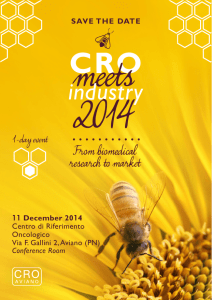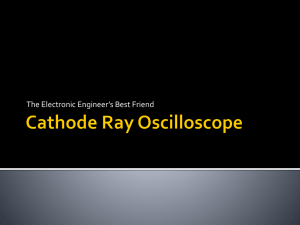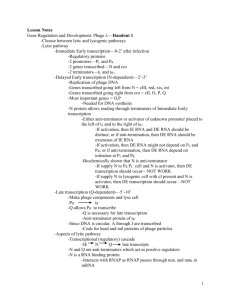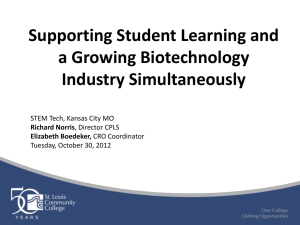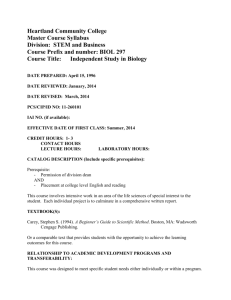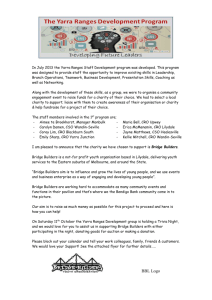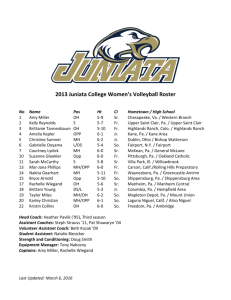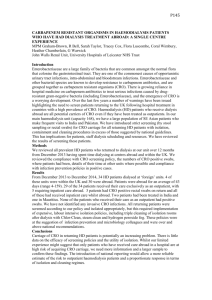2020(S09)_Cro2activator
advertisement
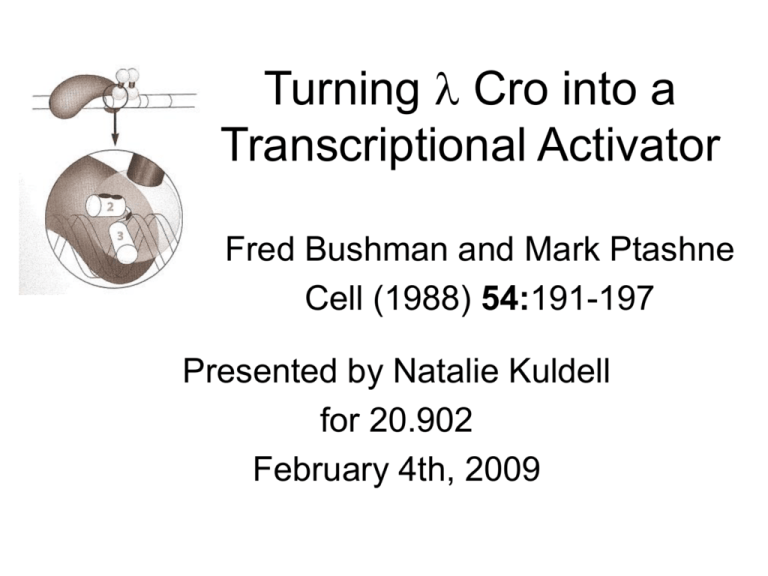
Turning Cro into a Transcriptional Activator Fred Bushman and Mark Ptashne Cell (1988) 54:191-197 Presented by Natalie Kuldell for 20.902 February 4th, 2009 Small patch of acidic residues is necessary and sufficient for transcriptional activation Figure 1 cI normally activates transcription cro normally represses transcription cro/cI chimera activates transcription! Site-directed mutagenesis of cro helix to make acidic patch cartoon of cI binding DNA Figure 2 Thr17 Lys21 Asp22 fig from “A Genetic Switch” Tyr26 4 amino acid substitution --> “cro67” Why might this work? Site-directed mutagenesis of cro helix to make acidic patch Figure 2 Thr17 Lys21 Asp22 Tyr26 4 amino acid substitution --> “cro67” Site-directed mutagenesis of cro helix to make acidic patch Figure 2 Thr17 Lys21 Asp22 Tyr26 4 amino acid substitution --> “cro67” Site-directed mutagenesis of cro helix to make acidic patch Figure 2 Thr17 Lys21 Asp22 Tyr26 4 amino acid substitution --> “cro67” Site-directed mutagenesis of cro helix to make acidic patch Figure 2 Thr17 Lys21 Asp22 Tyr26 4 amino acid substitution --> “cro67” Protein -helix recognizes sequence in DNA major groove model of lac repressor binding lac operator http://www.bact.wisc.edu/Microtextbook/index.php?module=Book&func=displaychapter&chap_id=35&theme=printer Protein -helix recognizes sequence in DNA major groove Wild type cro • binds OR3>>OR2 = OR1 • binding to OR3 shuts off tx’n from PRM Wild type cI • binds OR1>OR2>OR3 • binding to OR2 activates tx’n from PRM Protein -helix recognizes sequence in DNA major groove Wild type cro • binds OR3>>OR2 = OR1 • binding to OR3 shuts off tx’n from PRM Wild type cI • binds OR1>OR2>OR3 • binding to OR2 activates tx’n from PRM cro67 • binds? OR1>OR2>OR3 • activates? Figure 3 Protein -helix recognizes sequence in DNA major groove Wild type cro • binds OR3>>OR2 = OR1 • binding to OR3 shuts off tx’n from PRM Wild type cI • binds OR1>OR2>OR3 • binding to OR2 activates tx’n from PRM cro67 • binds? OR1=OR2>OR3 • activates? Figure 3 cro67 activates transcription in vitro Figure 4 [cro67] In vitro tx’n rxn’s 0 395 bases + buffer + DNA w/ PRM + PR cro67 (purified) 250 bases + 32P-ATP, CTP, GTP or UTP 37° 10’ then + RNAP 37° 10’ then +formamide to gel cro67 activates transcription in vitro Figure 4 cut out bands and count Observe: txn of PR ~5x 395 bases ~5x 250 bases as txn of PRM when cro67 added Q’s: What are extra bands? Is cro67 bound in natural way? cro67 binds operator sequences as expected Figure 4 [cro67] DNase footprint 0 + buffer + 32P-DNA w/ PRM + PR cro67 (purified) 37° 10’? then + DNase 37° 10’? then +formamide to gel? Observe: OR1=OR2>OR3 Q: is assay sensitive to different conformations of bound prot? cro67 activates transcription in vitro Supporting data/controls Figure 5 Wild type cro does not activate txn in vitro using in vitro txn rxn, DNase ftpt Figure 6 cro67 does not activate txn from other promoters cro67 in vivo exp’ts hampered by low affinity for operators (~100x < wt cro) Summary of 434 cI data look at****** patch more acidic cI inc act’n patch more basic operator occupancy dec act’n sat’d dec act’n sat’d operator binding normal normal ** in vivo (-gal assays on lysogen) vs 434 cI inc act’n ** in vivo DMS ftpt ** in vitro txn rxns, DNase ftpt Turning cro into a transcriptional activator key assumption in vitro conclusions have meaning in vivo biggest mistake mixing the 434 work in not pushing in vivo work significance/meta-lessons – – – – – protein engineering by analogy (cro is like cI, thus…) small changes (e.g., individual AAs) are important good data enables thoughtful experiments be open to surprises (e.g., DNA binding) ask the next question: does activation work the same way in eukaryotic cells?
